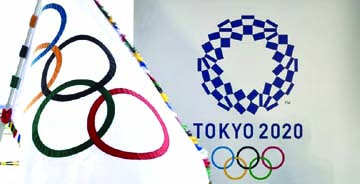
Russia have been banned from all major sporting events for the next four years, the World Anti-Doping Agency has confirmed.
The Russia flag and national anthem will not be allowed at events such as the Tokyo 2020 Olympics and 2022 football World Cup in Qatar.
Athletes that can prove they were not tainted by the scandal will able to compete under a neutral flag as was the case during the 2018 Pyeongchang Olympics.
WADA’s executive committee took the decision after it concluded that Moscow had tampered with laboratory data by planting fake evidence and deleting files linked to positive doping tests that could have helped identify drug cheats.
WADA President Sir Craig Reedie said: “The ExCo’s strong decision today shows WADA’s determination to act resolutely in the face of the Russian doping crisis, thanks to the Agency’s robust investigatory capability, the vision of the CRC, and WADA’s recently acquired ability to recommend meaningful sanctions via the Compliance Standard which entered into effect in April 2018. Combined, these strengths have enabled the ExCo to make the right decisions at the right time.
“For too long, Russian doping has detracted from clean sport. The blatant breach by the Russian authorities of RUSADA’s reinstatement conditions, approved by the ExCo in September 2018, demanded a robust response.
“That is exactly what has been delivered today. Russia was afforded every opportunity to get its house in order and re-join the global anti-doping community for the good of its athletes and of the integrity of sport, but it chose instead to continue in its stance of deception and denial.
“As a result, the WADA ExCo has responded in the strongest possible terms, while protecting the rights of Russian athletes that can prove that they were not involved and did not benefit from these fraudulent acts.
“On behalf of the ExCo, and of the many WADA stakeholders that supported the CRC recommendation, I would like to thank the members of the CRC for their expert and considered recommendation, as well as WADA I&I and the forensic experts for their skill, diligence and perseverance in getting to the bottom of this highly complex case.”
Russia, which has tried to showcase itself as a global sports power, has been embroiled in doping scandals since a 2015 report commissioned by the World Anti-Doping Agency (WADA) found evidence of mass doping in Russian athletics.
Its doping woes have grown since, with many of its athletes sidelined from the past two Olympics and the country stripped of its flag altogether at last year’s Pyeongchang Winter Games as punishment for state-sponsored doping cover-ups at the 2014 Sochi Games.
Monday’s sanctions had been recommended by WADA’s compliance review committee in response to the doctored laboratory data provided by Moscow earlier this year.
One of the conditions for the reinstatement of Russian anti-doping agency RUSADA, which was suspended in 2015 in the wake of the athletics doping scandal but reinstated last year, had been that Moscow provide an authentic copy of the laboratory data.
The sanctions effectively strip the agency of its accreditation.
Sports Minister Pavel Kolobkov last month attributed the discrepancies in the laboratory data to technical issues.
Some Russian officials, meanwhile, have branded the call for sanctions unfair and likened it to broader Western attempts to hold back the country.
If RUSADA appeals the sanctions endorsed by WADA’s executive committee, the case will be referred to the Court of Arbitration for Sport (CAS), WADA has said.

